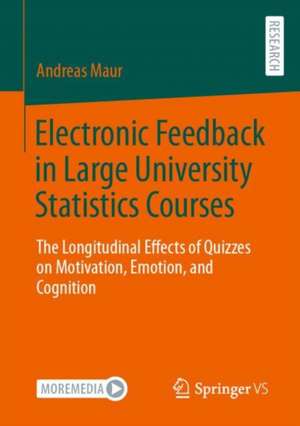Electronic Feedback in Large University Statistics Courses: The Longitudinal Effects of Quizzes on Motivation, Emotion, and Cognition
Autor Andreas Mauren Limba Engleză Paperback – 19 mai 2023
Preț: 643.99 lei
Preț vechi: 757.63 lei
-15% Nou
Puncte Express: 966
Preț estimativ în valută:
123.23€ • 128.92$ • 102.37£
123.23€ • 128.92$ • 102.37£
Carte tipărită la comandă
Livrare economică 02-16 aprilie
Preluare comenzi: 021 569.72.76
Specificații
ISBN-13: 9783658416195
ISBN-10: 365841619X
Ilustrații: XXIX, 406 p. 36 illus., 6 illus. in color. Textbook for German language market.
Dimensiuni: 148 x 210 mm
Greutate: 0.52 kg
Ediția:1st ed. 2023
Editura: Springer Fachmedien Wiesbaden
Colecția Springer VS
Locul publicării:Wiesbaden, Germany
ISBN-10: 365841619X
Ilustrații: XXIX, 406 p. 36 illus., 6 illus. in color. Textbook for German language market.
Dimensiuni: 148 x 210 mm
Greutate: 0.52 kg
Ediția:1st ed. 2023
Editura: Springer Fachmedien Wiesbaden
Colecția Springer VS
Locul publicării:Wiesbaden, Germany
Notă biografică
Andreas Maur's activities at the Chair of Business Education at the University of Mainz focus on digital teaching approaches (including learning videos, e-quizzes, and blended learning formats) in a synergistic interplay of implementation and research.
Textul de pe ultima copertă
Digital tools and pedagogies in public higher education are unfolding their potential by providing large groups of students with automated, continuous learning and feedback opportunities. However, most of the existing studies are cross-sectional, unidirectional and focus on a limited selection of relevant target variables and instructional features. In a field study, Andreas Maur used longitudinal latent structural equation modelling with a large sample of students to analyse the interrelations between formative feedback from electronic quizzes and different facets of the control value theory of achievement emotions. The results suggest that regular quizzes most consistently improve self-efficacy, anxiety, effort, course enjoyment, and hopelessness over time. Only feedback effects related to intrinsic motivation were consistently less effective for female and less proficient students, and for students in traditional versus flipped classrooms. These findings highlight the need to scaleup formative feedback in higher education and to cultivate feedback systems with higher levels of sophistication, adaptability, and gamification mechanics.
About the author
Andreas Maur's activities at the Chair of Business Education at the University of Mainz focus on digital teaching approaches (including learning videos, e-quizzes, and blended learning formats) in a synergistic interplay of implementation and research.
About the author
Andreas Maur's activities at the Chair of Business Education at the University of Mainz focus on digital teaching approaches (including learning videos, e-quizzes, and blended learning formats) in a synergistic interplay of implementation and research.
